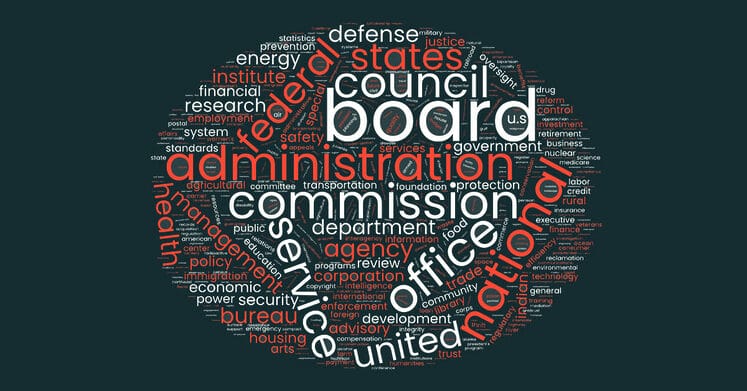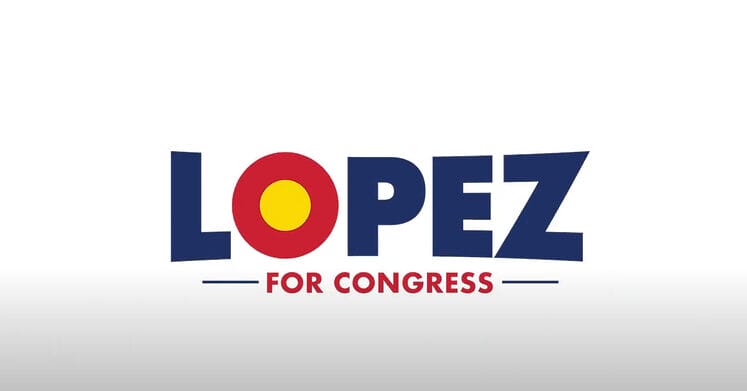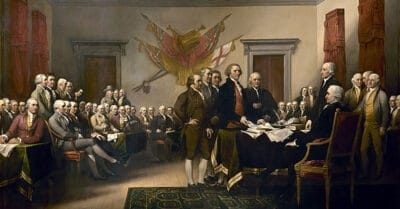
Many of the Progressive bureaucracies have aspirational names to give them purpose and a goal: Environmental Protection Agency, the Financial Stability Oversight Council, or the US Commission of Fine Arts. It is easy to dismiss names these days with how cheesy congress is about naming things in order to sell what they want such as the CRACK Act (Cutting Rampant Access to Crack Kits) or the Cares Act (Coronavirus Aid, Relief, and Economic Security). But just as these Acronym Bills are names created in the desire to sell them to the public, the names of the bureaucracies are also given these aspirational names in the same desire to sell themselves to the public. Progressives then deviously use a truth after getting these bureaucracies implemented; a truth that the founding fathers not only acknowledge but also used in the Federalist Papers to garner public support for the Constitution. Progressives use this truth to push an expanded power of the federal government and expand the bureaucracies beyond their originally intended power, leaving conservatives dithering in the background wondering how this truth was used against them.
Federalist 31 begins by listing general truths and maxims concerning ethics and politics. Two of those maxims are that every power ought to be commensurate with its object and that there ought to be no limitation of a power destined for a purpose that is incapable of limitation. To prove both maxims, Federalist 31 uses the example of national defense. If our government is responsible for providing for the national defense, then it needs to have every power necessary for the full accomplishment of that task; essentially having the capability to execute those powers without being controlled. For instance, if the executive branch were to be required to have a vote of congress before being allowed to send troops to repel a foreign incursion, we can logically see that our government would be overly controlled and unable to achieve its responsibility. Likewise, if the national government were unable to raise the revenue necessary to pay for the needed troops and infrastructure required to provide for the proper national defense then we can again see that the powers given to the government cannot be limited if its responsibility is equally unlimited.
Taking the Federalists truths and maxims, let’s see how they apply to government bureaucracies. If we set aside for now whether the bureaucracies should exist in the first place, then we need to see whether their powers are commensurate with their purpose and what limitations should be given to them to achieve the responsibilities entrusted to their keeping. The Environmental Protection Agency has a name that initially implies powers that must be nearly unlimited in scope: protection of the environment that surrounds all of us. The EPA was essentially created with the idea that its powers not be limited. The EPA has continued to seek more and more power via the Clean Water Act by redefining what the waters of the US are. Luckily, the courts keep striking down their blatant power grabs, but using the maxim truths in Federalist 31, one might agree with their desire to get more authority. After all, if their responsibility is to keep the waters of the US clean, then their power should be commensurate with their responsibility. The same concept applies to the Federal Reserve Board. One of their responsibilities is to set the country’s monetary policies to promote maximum employment and to provide stable prices in the US. Again, it is an easy argument for Progressives to claim that they cannot achieve this purpose if we continually try to restrict their powers. When Conservatives make the argument that we should restrict the powers of these Progressive bureaucracies, the Progressives rightly claim these bureaucracies cannot accomplish their objectives without the expanded powers. Conservatives lose again and again because we are fighting the wrong battle and losing because we are fighting against an evident truth.
There is no doubt that the Progressives have sent our country floundering due to the copious number of bureaucracies created. The argument and question should not be whether these agencies should have more power to achieve their purpose but rather whether these agencies should exist at all. If every power entrusted to the federal government should be commensurate to its object, then perhaps we are entrusting too much to the federal government. Entrusting the federal government to become intimately involved in our economy or inviting the federal government into regulating every single rain drop and snowflake is obviously a breach of the intent and goal of a free society as envisioned by our Founders. This abundance of trust and creation of more control is much more in line with Karl Marx and the tyrannical progressive ideology. Conservatives, elected representatives, and the citizens of this republic should be arguing against the existence of these overreaching bureaucracies in the first place. We need to be arguing against Congress divesting all its power to these autonomous government agencies and instead asking Congress to do what it was intended.
Whereas an ideal goal would be to abolish all the bureaucracies and start anew, there may be a natural middle ground to abolishing the governmental bureaucracy or giving the bureaucracies nearly unlimited powers: we can both rename and redefine the purpose to the agencies. I agree that the Agency to Fulfil Congress’s Environmental Legislation (AFCEL) is not as easy to say as EPA, it does, however, achieve the purpose of properly defining the responsibility of the agency and thereby restricting its required power. The Fed’s goal should not be as grandiose but instead should be narrowly defined. Instead of giving our agencies and bureaucracies these lofty ideals and goals to achieve, we instead must give them narrow and achievable goals which will then naturally limit their power. Progressives will then be unable to use these maxims of government against us and we would then slowly restore government to its proper place within our society.









Responses